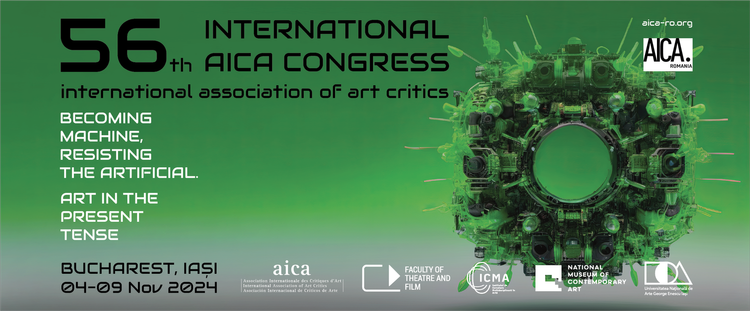November 4 - 9, 2024 | 56TH AICA International Congress Bucharest and Iaşi, Romania
June 28, 2024
Many recent comments regarding contemporary art making revolve around the increasing presence of digital means of production and distribution. Expressed mostly in a critical voice, in both popular press and scholarly periodicals, such observations address specifically the emergence and growing popularity of various Artificial Intelligence [AI] visualization systems. AI’s capability to transform the “prompts” introduced by the user on the application into practically infinite variations of digital images or text fragments has radically disrupted the traditional role of the artist and of the institutions. Indeed, the partial delegation of the creative act to the machine, and the subsequent conflicting encounter between individual agency and computer control, reopened old – although timely and pertinent – questions related to (artistic) originality, uniqueness, value, authorship, and copyright.
In a world dominated by military conflicts, climate change, migration crisis, fake news, and political rearrangements, the digital ecosystem – in which AI is one among other major actors – plays a crucial role. We, volens nolens, increasingly identify ourselves with the machine, while we employ various strategies of resisting the artificial. Art is an important part of this process. How can art critics and practitioners meet the challenges of present and future digital developments? To what extent do humans and machines share the creative process in these circumstances? To what extent does AI affect established notions and practices related to authorship and the ethics and intellectual property of the art object? How do AI and the fluidity of digital ecosystems affect artists’ (cultural) identity, bodies, and perception? How reliable is the archive and how consistent is the memory in the age of the fake? How does the rise of machine learning and various digital prostheses reflect structural economic disparities between what is called the Global South and technologically advanced societies? How do the recent mechanisms of production and circulation of images impact art criticism? How does digital behavior influence today's patterns of critique, aesthetic reception, vision, as well as the notion of spectatorship? Can the analogical provide ways to resist the algorithmic transformation of subjectivities as well as the psychopolitical machine of the Big Tech through contemporary art?
We strive for an understanding of the recent digital changes as an integrated part of contemporary society and consider them from different artistic and theoretical perspectives. The theme of the congress is an invitation to reflect, contextualize, uphold, criticize, comment, etc. about the art at the present tense.
Topics include but are not restricted to the following:
“Post” like in Posthumanism
The scientific turn in contemporary art
Memory, Archive, Database
Art criticism and its relevance in the new digital ecosystem
Local, global, glocal
(Former) Western, post-socialist and non-aligned art
Ethics of the fake
The crisis of the documentary form
What comes after post-photography?
Reflections of identity online and offline
History repeating
Critical imaginaries
Poetics and politics of the artificial
But is it art? Principles, values, frameworks of interpretation
Bodies and affect
Techno-capitalism
Technology as a resource: economic disparities and uneven access
AI, politics, and censorship
Resisting psychopolitics
Biomedia and the artificial nature
Means of critique in the digital age
Art biennials and their relevance today
We welcome perspectives on these themes from various artistic and theoretical areas, and a wide range of knowledge and insights.
Please send abstracts of approx 400-500 words and a short bio up to 200 words to: aica.romania.2024@gmail.com
Deadline for abstract and bio submissions: July 28th, 2024.
All applicants will learn on or shortly after 30th of July whether they have been successful in their applications.
Each presentation will be twenty minutes long, followed by a ten-minute discussion period.
The language of the congress is English. Please note that we accept only in-person presentations.
Congress registration will start after July 15th 2024.
Speakers are exempted from the Congress fee.
The cost of participation will be 20 EUR per day and it will include lunch and evening reception. UNESCO Director, the Secretariat, the Board of the Romanian section, heads of Committees, Keynote Speakers, Speakers and Moderators will be exempt.
Selected papers will be published in an edited volume at an academic publishing house TBD.
Keynote speakers (TBA)
The congress’ program includes: three full days of plenary sessions, two keynote lectures (TBA), museum and gallery visits, city tour, and meeting with the local artistic community. The congress ends in Bucharest on the evening of November 7th and will be followed by a closing reception.
The AICA congress includes a post-congress trip to the city of Iași, 8-9 November.
The post-congress program includes: one full day of round tables, a keynote lecture (TBA), museum visits, and meeting with the local artistic community. Please note that the post-congress trip is at participants’ own expenses, although organizers are happy to provide lunch, evening reception and local transportation.
Delegates to the post-Congress in Iaşi will travel by air, train or road on Friday, 8th of November. Estimated times for one-way travel between Bucharest and Iaşi are: 50 minutes by air, ca. 6hours 45min by train, and ca. 5hours 30 min by car. Our advice to all delegates would be to arrange their own international travel to and from Bucharest, and to those participating in the Post Congress to make their own arrangements for travel within Romania from Bucharest to Iaşi and back. Please note that there are flight connections from Iași to various European cities.
Further details regarding the daily program of the congress and the post-congress, information about travel and accommodation will follow soon.

